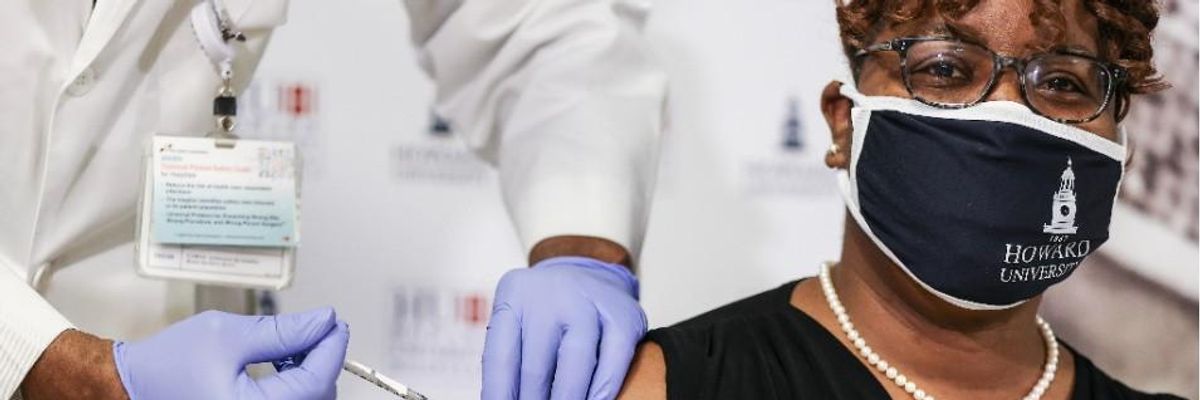Just over a year ago, the world looked on in shock as the Chinese city of Wuhan imposed the first coronavirus lockdown. Since then, people around the world have made extraordinary sacrifices and have shown great solidarity in containing the spread of the virus.
Yet, when it comes to rolling out vaccines, the world's political leaders seem to have forgotten that we are all in it together.
The European Union has in recent weeks been engaged in a dispute with vaccine makers after AstraZeneca admitted it was expecting a major shortfall in production, and has been accused of prioritizing deliveries to the UK. In response, European officials have introduced temporary export restrictions on vaccines produced in its territories, giving member states the option of limiting exports outside the EU to countries like the UK, the United States and even South Africa.
On the surface, this may look like a fight over contractual commitments gone awry, but it reveals a much uglier truth: Wealthy countries are locked in a self-defeating and ultimately avoidable zero-sum game over vaccine supplies. And it is a game that poorer countries will inevitably lose--to the cost of us all.
Rich countries have ordered enough doses to vaccinate their populations three times over, while 9 in 10 people in nearly 70 poorer countries are unlikely to be vaccinated at all this year. This is according to analysis in December 2020 by the People's Vaccine Alliance, a group of organizations including Amnesty International campaigning for free and fair distribution of vaccines.
We know that when it comes to Covid infection and prevalence, nobody is safe until we are all safe. But the efforts of almost every rich country to snatch up vaccines reminds us of wealthy travelers paying for speedy boarding at the airport. They might be seated first, but the plane will only take off to its Covid-free destination once all the passengers --both rich and poor--are on board.
While Europeans are right to be concerned about what this dispute might mean for their access to a vaccine, we need to remember that this is a concern shared by everyone across the world.
The situation in South Africa underscores exactly why the world can't afford to engage in this everyone-for-themselves approach. As new variants of Covid-19 emerge, including a new strain identified by South African scientists that appears to be more contagious than the original strain, the stakes have become even higher for ensuring rapid and equitable delivery of vaccines.
"The European Union has pre-financed the development of the vaccine and the production and wants to see the return,"
say EU officials, with the bloc having invested EUR2.7 billion (about $3.3 billion) into research and development of several vaccines. However, many South Africans have also contributed by
participating in trials to test the vaccines precisely because they thought this might be their only chance of receiving one.
Mtshaba Mzwamadoda, who is from a township in the south of Cape Town,
told the New York Times that he was signing up to be in Johnson & Johnson's clinical trials because he believed this was his only chance. "The people at the top, they're going to get the vaccine, the people who have power."
Getting the vaccine to the world's poorest will require an approach based on solidarity rather than competition, with governments and companies working together to boost global supply rather than fight over it.
There are some glimmers of hope: The recent news that companies including
Pfizer, Sanofi, GSK and Curevac have struck deals with each other to produce more vaccines shows that progress can be made together. But these deals are just a drop in the bucket. Meeting the scale of the global challenge will mean taking such collaboration to a whole new level.
The EU can start by dropping its opposition to measures proposed by India and South Africa at the World Trade Organization, which would waive intellectual property protections for life-saving products used to tackle Covid-19. The proposal would facilitate technology transfers so that Covid-19 medical products, including vaccines, could be produced more quickly and affordably by manufacturers around the world.
With both rich and poor countries alike now struggling for supply, these proposals are a no-brainer for rapidly scaling up vaccine production so that everyone can benefit.
Pharmaceutical companies must fulfil their human rights responsibilities too, which is why Amnesty International is campaigning for companies, including AstraZeneca, Pfizer-BioNTech and Moderna, to share their knowledge and technology so that everyone in the world will have a fair shot at a vaccine.
So far, neither governments nor companies have been willing to truly work together on the scale that we need. But if we want to come out of this global crisis together, sooner and with our consciences intact, then that must change.

